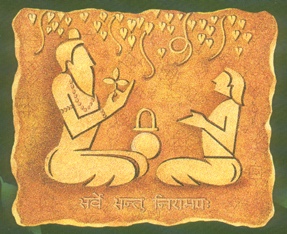The life science of Ayurveda explains that we are born perfect creations, with a unique balance of space, air, fire, water, and earth – the 5 basic elements of all things. This is our Prakruti. Then life happens, - the food we eat, coupled with our activities and environment skew that perfect balance. This is our Vikruti. Imbalance leads to illness, and when we can’t curb the illness, it can lead to chronic disease that we are taught to live with, such as arthritis, allergies, thyroid problems and inflammation.
Who are you? What is your Prakruti? Your unique blueprint?
A simple Dosha Quiz – this helps us understand our basic nature.
Dosha is a categorization of your unique elemental make up. Once you know that, you can begin to solve the riddle of nature.
Ayurveda, literally the Science of Life, has its origins in the Vedas, which cover the processes of nature, anatomy, physiology, and surgery. These are the oldest scientific and philosophical texts known to man, dating back over 5,000 years from the caves and valleys of the Himalayas.
The Rig Veda introduces the purpose of an Ayurvedic lifestyle; to experience health and happiness of the mind, body and spirit in accordance with nature. This philosophy understands that humans are an integrated and complex creation, each of us as unique as a feathery snowflake.
Ayurveda and Yoga are both rooted in Sankhya philosophy.
Yoga works to connect us with our highest self, innate knowledge and limitless power. It detoxes the body, brings stability, empowerment, and transformation through asana, pranayama, and meditation.
Ayurveda gives us the health to potentize body, mind, and spirit, giving our yoga practice the support it needs to ascend to greater heights through proper diet, herbs, yoga techniques, and healthier daily habits.
Living with your Dosha:
Our Vata friends exhibit qualities of space and air – always on the move, creative, flowing, and great conversationalists! Usually very flexible in body and mind, they tend to be very tall or very short. They are like happy butterflies or antelopes.
When they are out of balance, they can become scattered, fearful, anxious, and lose their appetite. Things that push Vata out of balance include dry, light, airy foods, excessive travel, cold windy weather and too much talking.
Our Pitta friends are fire and water – they tend to be sharp, always solving puzzles, and reading books. They love to transform experience into knowledge. They are competitive and like to take charge. Medium and intense, they have amazing appetites and can easily control their weight through rapid digestion. They are like prowling tigers, observant and strong. When out of balance, they can be hot heads, and experience IBS, sour stomach, or rashes.
Things that push Pitta out of balance include spicy or sour foods, hot weather, excessive competition, and too much work or too little compassion.
Our Kapha friends are like water and earth – they are steady, calm and resilient. They love to love and will be the first to give you a hug. Slow to change, their consistency can be a benefit or get them stuck. They are softer and rounder in physique, with large eyes, thick hair and amazing smiles. They are like plush teddy bears and Koalas. When out of balance, they can become depressed, lethargic and may become overweight.
Things that push Kapha out of balance include heavy, sticky or sweet foods, inactivity, and cold damp weather.
This basic Ayurvedic principle gives us an understanding of our constitution, and acceptance of our true and perfect nature (Prakruti). It teaches us to recognize the basic nature of every large and small thing around us, and how they cause imbalance (Vikruti).
Welcome to the blueprint for a healthier diet and lifestyle for sustained health and happiness. Through each season and stage of our long and healthy lives, Ayurveda has the answer...this is only the beginning. There is so much to learn about how to cook for yourself, your family, the best way to detoxify your body and stimulate your mind - every choice has the opportunity to heal!
- KirstenBurch's blog
- Log in or register to post comments


